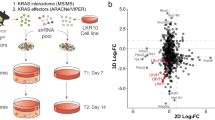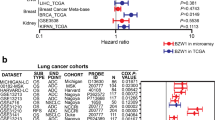Abstract
Secreted frizzled related protein 1 (SFRP1) is an antagonist of the transmembrane frizzled receptor, a component of the Wnt signaling pathway, and has been suggested to be a candidate tumor suppressor in several human malignancies. Since SFRP1 is located at chromosome 8p11, where lung cancers also exhibit frequent allelic loss, we hypothesized that the inactivation of SFRP1 is also involved in lung carcinogenesis. To substantiate this, we performed mutational analysis of SFRP1 for 29 non-small-cell lung cancer (NSCLC) and 25 small-cell lung cancer (SCLC) cell lines, and expression analysis for the same cell lines. Although somatic mutations were not detected in the coding sequence, downregulation of SFRP1 was observed in 14 (48%) NSCLC and nine (36%) SCLC cell lines. We analysed epigenetic alteration of the SFRP1 promoter region and detected hypermethylation in 15 (52%) of 29 NSCLC cell lines, two (8%) of 25 SCLC cell lines, and 44 (55%) of 80 primary lung tumors. By comparing the methylation status with SFRP1 expression, we found a significant correlation between them. We also performed loss of heterozygosity (LOH) analysis and found that 15 (38%) of 40 informative surgical specimens had LOH in the SFRP1 gene locus. Furthermore, we performed colony formation assay of two NSCLC cell lines (NCI-H460 and NCI-H2009) and found the reduction of colony formation with SFRP1 transfection. In addition, we also detected that SFRP1 inhibits the transcriptional activity of β-catenin, which is thought to be a downstream molecule of SFRP1, with luciferase reporter assay. Our current studies demonstrated that the SFRP1 gene is frequently downregulated by promoter hypermethylation and suppresses tumor growth activity of lung cancer cells, which suggests that SFRP1 is a candidate tumor suppressor gene for lung cancer.
This is a preview of subscription content, access via your institution
Access options
Subscribe to this journal
Receive 50 print issues and online access
$259.00 per year
only $5.18 per issue
Buy this article
- Purchase on Springer Link
- Instant access to full article PDF
Prices may be subject to local taxes which are calculated during checkout



Similar content being viewed by others
References
Caldwell GM, Jones C, Gensberg K, Jan S, Hardy RG, Byrd P, Chughtai S, Wallis Y, Matthews GM and Morton DG . (2004). Cancer Res., 64, 883–888.
Emi M, Fujiwara Y, Nakajima T, Tsuchiya E, Tsuda H, Hirohashi S, Maeda Y, Tsuruta K, Miyaki M and Nakamura Y . (1992). Cancer Res., 52, 5368–5372.
Giles RH, van Es JH and Clevers H . (2003). Biochim. Biophys. Acta, 1653, 1–24.
Girard L, Zöchbauer-Müller S, Virmani AK, Gazdar AF and Minna JD . (2000). Cancer Res., 60, 4894–4906.
Horii A, Nakatsuru S, Miyoshi Y, Ichii S, Nagase H, Ando H, Yanagisawa A, Tsuchiya E, Kato Y and Nakamura Y . (1992). Cancer Res., 52, 6696–6698.
Howe LR and Brown AM . (2004). Cancer Biol. Ther., 3, 36–41.
Ito G, Uchiyama M, Kondo M, Mori S, Usami N, Maeda O, Kawabe T, Hasegawa Y, Shimokata K and Sekido Y . (2004). Cancer Res., 64, 3838–3843.
Ito M, Ito G, Kondo M, Uchiyama M, Fukui T, Mori S, Yoshioka H, Ueda Y, Shimokata K and Sekido Y . (2005). Cancer Lett., 225, 131–139.
Klopocki E, Kristiansen G, Wild PJ, Klaman I, Castanos-Velez E, Singer G, Stohr R, Simon R, Sauter G, Leibiger H, Essers L, Weber B, Hermann K, Rosenthal A, Hartmann A and Dahl E . (2004). Int. J. Oncol., 25, 641–649.
Lee AY, He B, You L, Dadfarmay S, Xu Z, Mazieres J, Mikami I, McCormick F and Jablons DM . (2004). Oncogene, 23, 6672–6676.
Maeda O, Usami N, Kondo M, Takahashi M, Goto H, Shimokata K, Kusugami K and Sekido Y . (2004). Oncogene, 23, 964–972.
Minna JD, Fong K, Zöchbauer-Müller S and Gazdar AF . (2002). Cancer J., 8 (Suppl. 1), S41–S46.
Mori S, Ito G, Usami N, Yoshioka H, Ueda Y, Kodama Y, Takahashi M, Fong KM, Shimokata K and Sekido Y . (2004). Cancer, 100, 1673–1682.
Morin PJ and Weeraratna AT . (2003). Cancer Treat. Res., 115, 169–187.
Pei J, Balsara BR, Li W, Litwin S, Gabrielson E, Feder M, Jen J and Testa JR . (2001). Genes Chromosomes Cancer, 31, 282–287.
Polakis P . (2000). Genes Dev., 14, 1837–1851.
Sanchez-Cespedes M, Parrella P, Esteller M, Nomoto S, Trink B, Engles JM, Westra WH, Herman JG and Sidransky D . (2002). Cancer Res., 62, 3659–3662.
Sekido Y, Fong KM and Minna JD . (2003). Annu. Rev. Med., 54, 73–87.
Sekido Y, Sato M, Usami N, Shigemitsu K, Mori S, Maeda O, Yokoi T, Hasegawa Y, Yoshioka H and Shimokata K . (2002). Cancer Genet. Cytogenet., 137, 33–42.
Shigemitsu K, Sekido Y, Usami N, Mori S, Sato M, Horio Y, Hasegawa Y, Bader SA, Gazdar AF, Minna JD, Hida T, Yoshioka H, Imaizumi M, Ueda Y, Takahashi M and Shimokata K . (2001). Oncogene, 20, 4249–4257.
Stoehr R, Wissmann C, Suzuki H, Knuechel R, Krieg RC, Klopocki E, Dahl E, Wild P, Blaszyk H, Sauter G, Simon R, Schmitt R, Zaak D, Hofstaedter F, Rosenthal A, Baylin SB, Pilarsky C and Hartmann A . (2004). Lab. Invest., 84, 465–478.
Sunaga N, Kohno T, Kolligs FT, Fearon ER, Saito R and Yokota J . (2001). Genes Chromosomes Cancer, 30, 316–321.
Suzuki H, Gabrielson E, Chen W, Anbazhagan R, van Engeland M, Weijenberg MP, Herman JG and Baylin SB . (2002). Nat. Genet., 31, 141–149.
Suzuki H, Watkins DN, Jair KW, Schuebel KE, Markowitz SD, Dong Chen W, Pretlow TP, Yang B, Akiyama Y, Van Engeland M, Toyota M, Tokino T, Hinoda Y, Imai K, Herman JG and Baylin SB . (2004). Nat. Genet., 36, 417–422.
Takada T, Yagi Y, Maekita T, Imura M, Nakagawa S, Tsao SW, Miyamoto K, Yoshino O, Yasugi T, Taketani Y and Ushijima T . (2004). Cancer Sci., 95, 741–744.
Toyooka S, Fukuyama Y, Wistuba II, Tockman MS, Minna JD and Gazdar AF . (2002). Clin. Cancer Res., 8, 2292–2297.
Uchiyama M, Usami N, Kondo M, Mori S, Ito M, Ito G, Yoshioka H, Imaizumi M, Ueda Y, Takahashi M, Minna JD, Shimokata K and Sekido Y . (2003). Int. J. Cancer, 107, 962–969.
Usami N, Sekido Y, Maeda O, Yamamoto K, Minna JD, Hasegawa Y, Yoshioka H, Imaizumi M, Ueda Y, Takahashi M and Shimokata K . (2003). Oncogene, 22, 7923–7930.
Wistuba II, Behrens C, Virmani AK, Milchgrub S, Syed S, Lam S, Mackay B, Minna JD and Gazdar AF . (1999). Cancer Res., 59, 1973–1979.
Yuan BZ, Jefferson AM, Baldwin KT, Thorgeirsson SS, Popescu NC and Reynolds SH . (2004). Oncogene, 23, 1405–1411.
Acknowledgements
We acknowledge the assistance of Dr Adi F Gazdar for the lung cancer cell lines, and Dr Bert Vogelstein for providing the pGL3-OT and pGL3-OF. We also thank Dr Koichi Fujita and Dr Norio Mukoyama for the surgical specimens and Ms Hiroko Kaga for skillful technical assistance. This research was supported by a Grant-in-Aid for Scientific Research from the Japan Society for the Promotion of Science.
Author information
Authors and Affiliations
Corresponding author
Rights and permissions
About this article
Cite this article
Fukui, T., Kondo, M., Ito, G. et al. Transcriptional silencing of secreted frizzled related protein 1 (SFRP1) by promoter hypermethylation in non-small-cell lung cancer. Oncogene 24, 6323–6327 (2005). https://doi.org/10.1038/sj.onc.1208777
Received:
Revised:
Accepted:
Published:
Issue Date:
DOI: https://doi.org/10.1038/sj.onc.1208777
Keywords
This article is cited by
-
Value of Plasma Methylated SFRP2 in Prognosis of Gastric Cancer
Digestive Diseases and Sciences (2021)
-
Norepinephrine-stimulated HSCs secrete sFRP1 to promote HCC progression following chronic stress via augmentation of a Wnt16B/β-catenin positive feedback loop
Journal of Experimental & Clinical Cancer Research (2020)
-
Downregulation of SFRP1 is a protumorigenic event in hepatoblastoma and correlates with beta-catenin mutations
Journal of Cancer Research and Clinical Oncology (2020)
-
Rab37 mediates exocytosis of secreted frizzled-related protein 1 to inhibit Wnt signaling and thus suppress lung cancer stemness
Cell Death & Disease (2018)
-
WNT signaling – lung cancer is no exception
Respiratory Research (2017)



